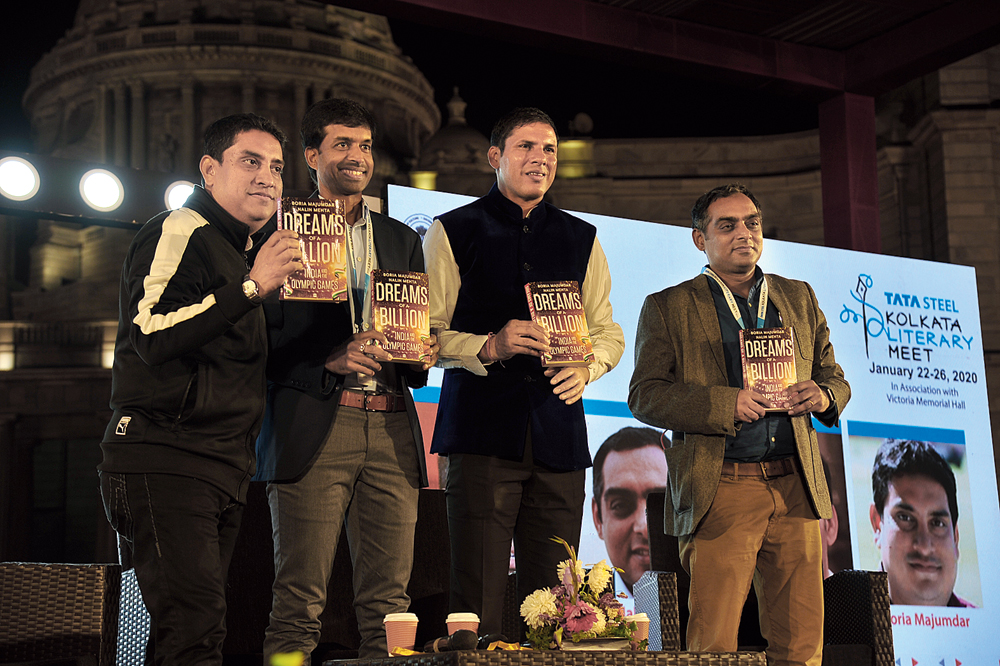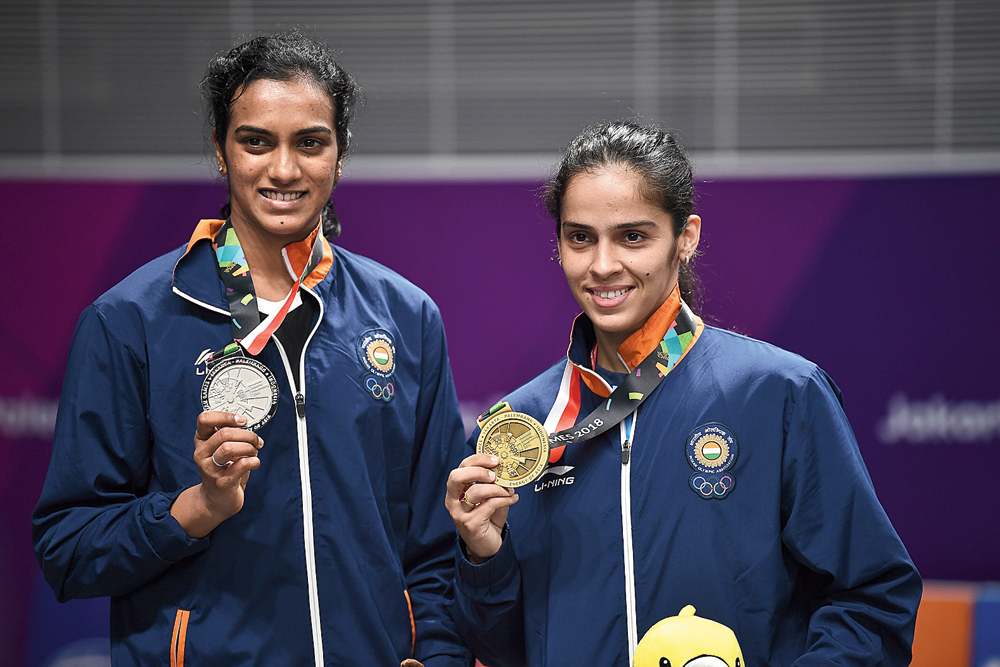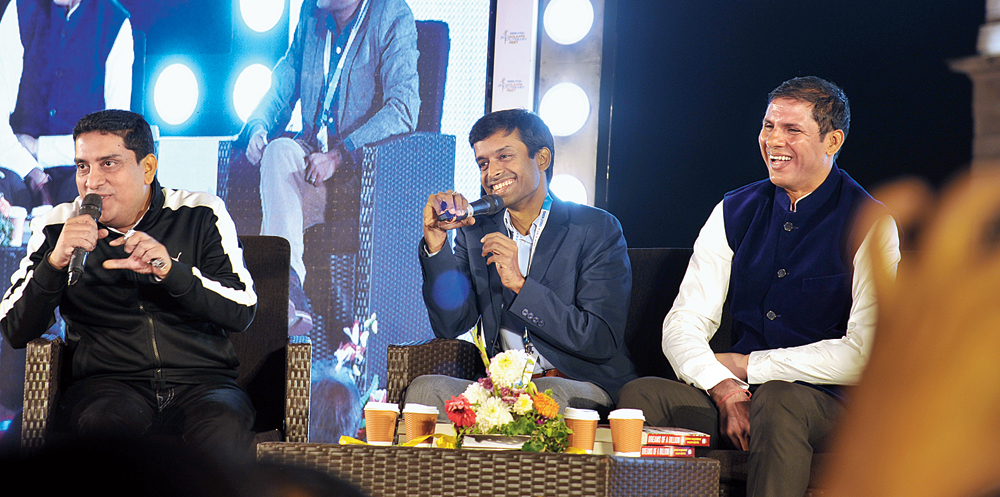Tata Steel Kolkata Literary Meet director Malavika Banerjee pulled out a strand of her hair. A chorus of ‘ouch’ descended upon the colourful shamiana at the Tata Steel Kolkata Literary Meet, in association with The Telegraph and Victoria Memorial Hall. The chilly January evening perhaps amplified the ouch factor. What Boria Majumdar — journalist and co-host of the upcoming session we had all gathered for — would say in the next 10 seconds would further add to that ‘ouch’. “... anybody who is sitting on row five or six, can you see that one strand of hair… can you see the tip of that one strand of hair? Abhinav Bindra lost his Rio (Olympic) medal by 1/3rd of that tip of hair”. OUCH! OUCH! OUCH!
Even as you sat in bewilderment, trying to fathom the magnitude of the anguish that threatens to shadow a sportsman, you are introduced to Pullela Gopichand and Devendra Jhajharia, the two champions on the panel for discussing ‘2020 Vision: India @ Olympics’. One mortgaged his bungalow to seize his dreams when his back was against the wall and produced badminton champions who have kept India’s fire burning at the Olympics. And another picked up a kulhari with his lone right hand to strengthen his shoulders, a demand of his discipline. He couldn’t afford anything more, but made the Paralympics his happy hunting ground with gold hauls in 2004 and 2016 Paralympic Games.
Stories of grit. Narratives of gumption. Emotions of glory, divine justice and the euphoria of cheering on an underdog to the winning podium. We in the audience put the seat belt on for an hour’s rally that rode on dreams, sustained by the embers of optimism.
Dreams do come true...
Believe it or not, All England Open Badminton Championships winner (2001) Pullela Gopichand didn’t know for sure that badminton would be his career till 1991. “When I started, Hyderabad didn’t even have a national champion. So, I never thought I will continue playing sport for a very long time. I started playing in the year 1985. In 1991, I won the junior nationals. I got my first job at Tata Steel in November 1991. That’s when my playing badminton was confirmed as a career. I never really dreamt or thought that I would become someone big,” said Gopi, under whose serene demeanour lies a man of steel.
The man who would tell his protege P.V. Sindhu to shout on the court. Boria narrated the tale. “P.V. Sindhu told me that ‘Gopi sir called me to academy and he said to me ‘shout, shout, shout, shout’… till the time she actually breaks down and starts crying. She screams in pain and agony… ‘why are you doing this to me?’ And, he said that’s ‘what I want you to do tomorrow on the court...,” paused Boria. Roaring applause in the audience partnered by baffling incredulity. Looks indeed are indeed deceptive!
We got a further sense of those nerves when he shared his believe-it-or-not struggle at building his champion-producing academy, Pullela Gopichand Badminton Academy in Hyderabad. “I thought as an All England champion... and I knew a lot of people… I knew people will start funding… unfortunately things did not happen as I had expected….,” he recalled. All he wanted to do was build a facility where future champions could be bred, a step towards making India, a land of 1,375,455,588, with only a handful of champions, a sporty nation. “When I won the All England, I realised that boss, if I can win the All England, many others can win. That’s how the thought of starting an academy came to mind... I learnt from a lot of coaches and went through a lot of injuries. When I won, I realised I had the formula which is required to win, but unfortunately, I didn’t have the body to last or use that formula long enough. I said: ‘Let me try and build something’. The challenges back then when I was playing were very fundamental. No lights, shaadi hua hai… these were the kind of problems we would have. So, when I wanted to coach, I thought it was very important that none of my students should have these problems… no shuttles, courts, gym, training ground… all of these things. I planned on building an academy and luckily for me, the then government gave me a piece of land. There was this gentleman N. Prasad who gave me a Rs 2 crore cheque to start off with,” he said.
Gopi, however, had no inkling of the arduous task he had undertaken. “As an All England champion, you were posing for pictures and signing autographs, but then suddenly people were not taking calls. I faced a lot of dejection in terms of people saying that ‘This is not a part of CSR and we cannot fund you’ or ‘Badminton doesn’t have the eyeballs to be a world sport’, ‘I don’t think Indians can win in this’…. Some people told me on my face that ‘No great player has become a great coach…. So, I don’t think you can become one’…. I went to Bombay (for a meeting) and after waiting for three days from 9.30am to 6.30 in the evening, I was told that ‘Gopi, I don’t think Indians have it in them to be champions and I don’t think that badminton as a sport has the eyeballs to be a champion’. I walked out crying that day, went back home, called my parents and wife… they live in a 1,000-yards bungalow which we made after the All England. I told them, I don’t think I can do this any more… we have to sell the house,” he said. They agreed within five minutes. Now, here was an embodiment of what raw passion looks like — P. Gopichand.
“Thankfully, the next day, we were able to mortgage the house. Luckily by then six years after the All England, my dad as a banker typically put the Rs 25 lakhs that I got from the government into the bank… that became 50. My brother gave me another 75 and then with my entire resources, we got a Rs 3 crore loan from the house… and that’s how we were able to finish the construction of the academy in 2008,” he paused. Around the same time, his mother was undergoing cancer treatment and his kids were one and two years old. A stunned silence of awe and reverence hung over the shamiana. Do a dare, do a Pullela Gopichand!

(L-R) Boria Majumdar, Pullela Gopichand, Devendra Jhajaria and Nalin Mehta at the launch of Dreams of a Billion: India and the Olympic Games at Tata Steel Kolkata Literary Meet. Boria and Nalin, also a co-host at the session, have penned the book that has been published by HarperCollins India and is priced at Rs 599. “This book is not just the story of Indian sports — it is the story of us as a nation; of our dreams and aspirations and how they play out for the few who represent a billion. It is the story of India and its journey told through the prism of sports,” Boria and Nalin write in the introduction. Picture: Chanchal Ghosh
He missed out on his kids’ childhood and his students are his kids. “One of the reasons I believe I have been able to contribute is, I felt, that these kids were my own.... So, when I talk about Gayatri and Vishnu’s childhood, Lakshmi (wife) will say, ‘He is lying because he never saw them grow up’. I was very fortunate that my parents and wife took care of those initial years,” said Gopi. A chuckle followed. “So much so that Lakshmi and I went for our first holiday almost nine years after we got married!”
Such was the investment that you could feel a crushed spirit and extreme disappointment when Gopi spoke about the fallout with his star student and also a protege, Saina Nehwal, probably independent India’s biggest poster girl for badminton. “When Saina left, I felt a sense of bitterness, anguish… I was unhappy about it. Then I saw her at the Olympics and I believed she had a golden chance to win that medal in Rio.... For me, every day in the morning I would get up because it was important for Saina… 5.30 in the morning was the training session. I needed to find another slot for Sindhu, which was 4.30 in the morning. Then suddenly when this happened after the World Championships of 2014, it was definitely something that I felt hurt about. With no disrespect to Prakash sir (Prakash Padukone)… he continues to be a role model.... For us, thanks to Prakash sir, we at least dreamt or believed that we Indians could win something as big as an All England. He was a real hero for us, but I felt something very dear had been taken away. I was in Copenhagen and she was in Hyderabad. I asked her to stay back for a day and she didn’t,” he said.
“She didn’t”. These words would ring in your ears as much as: “When I saw her lose that and when she came back and said, ‘I am not finding my rhythm and I am not able to figure it out. Can you help me out?’, there was no way I could say no to her. “There was no way I could say no to her”. Sports has a strange way of teaching you about life. In a split second, Gopi had taught us forgiveness.
A good mentor not only has the ability to nurture talent but also back it to the hilt. Guru Gopi told Sindhu: “Saina is going to be back, but that doesn’t mean that it is out of your time. How I manage is my problem… you just tell me what do you need and it will be done”. Respect.
Sportsmen are perhaps bound by a common spirit of never-say-die. Gopi’s quiet confidence was matched by Devendra Jhajharia’s iron will that saw him conquer the odds of being specially abled and top it off with Olympic golds, a feat few full-bodied men and women can even dare to dream. The Paralympian javelin thrower didn’t venture out of the house for a good one-and-a-half months after he lost his left hand at eight in an accident. His mother egged him on. “She said: ‘What problem do you have? Go out and play’. In school too, I was faced with the same question… ‘Aap toh differently-abled ho… aap game thori karoge’’’.
He believed he could. Back home, he sharpened his skills with a wooden javelin. His tenacity and skills saw him become a district champion. “I believed that ‘main kamzor nahin hoon… mujhe kaise kamzor kahenge’. I believed I could be the world champion. Sabhi ne meri mazak si udaai….,” said Devendra. With two Olympic golds, we know the joke is on whom, Devendra!
His wisdom, honed by harsh reality, bites you sharp. “We couldn’t even think about nutrition. I had spikes worth Rs 300-400… jab flight ke paisa khud deke jaa raha ho, nutrition aur physiotherapist ki kalpana karna bhi mere kheyal se galat hai. But I had the junoon. I won the gold medal with a world record,” he smiled.
While both Gopi and Devendra’s careers glitter with amazing highs, the challenges have been ignominious as onerous. A lot of us would have felt like giving up. They didn’t. Why? “I think the pleasure of having India go up for a gold and a silver and the national anthem being played, I think that is worth every effort in life,” said Gopi. “Subhidhaye aapni jageh hai, science aapni jageh hai, aur junoon aapni jageh hai. Jo junoon hai woh sabse aage hai,” said Devendra.
To the true patriots!

P.V. Sindhu and Saina Nehwal (File photo)
Guru Gopi on his star students: Saina Nehwal and P.V. Sindhu
Over the years, it’s been tough… is the least I can say, but needed to manage… and that’s what the India story is… when I look at the book (Dreams of a Billion: India and the Olympic Games), that’s what it is. If you go to a China, you won’t find that diversity. Here, it’s very different. Each one has taken a very different path and to bring that together to produce a medallist is a challenge which we have as a country.
Look at men’s badminton over the years. We can still say that there were people right from Nandu Natekar to Suresh Goel to Prakash Sir to me… some champions. But on the women’s side we didn’t have any. And, I think to start that off and bring in the confidence that Indian women can be strong enough to play at the highest level in the world, I think that’s what Saina has done and Sindhu has emulated.
Even in my dreams, if I had to say that this is my favourite trainee, I think that would be the end of me. It’s very important that a coach is seen as being fair as well.











